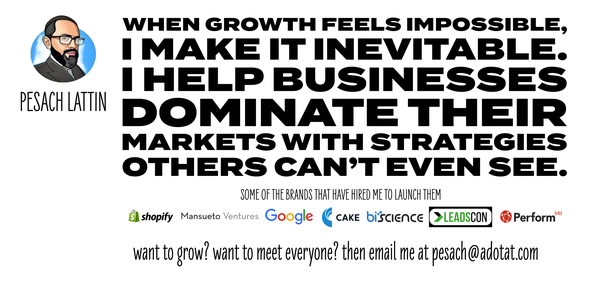The Metrics Don’t Matter: When Ad Tech Legends Let Loose
Ad tech
is a realm where metrics rule, buzzwords reign, and the players often take themselves just a bit too seriously. That is, until The Metrics Don’t Matter came along. Hosted by Pesach Lattin, the game show upends the usual ad tech rigor with a mix of trivia, humor, and pure chaos. This isn’t about analyzing dashboards or debating KPIs; it’s about taking the titans of the industry out of their comfort zones and seeing what happens when the stakes are nothing more than a laugh and some
bragging rights.
Last night’s episode featured Peter Naylor, the streaming ad aficionado whose career spans platforms like Netflix and Hulu, and Alan Wolk, co-founder of TV[R]ev and the guy who can explain why your favorite show keeps disappearing into streaming oblivion. Together,
these two industry icons traded their usual conference-stage polish for an hour of banter, absurd challenges, and just enough self-awareness to make it all work.
Breaking Down the Barriers
From the moment the cameras rolled, it was clear this wasn’t going to be a typical industry discussion. Pesach Lattin, ever the irreverent host, set the tone with his usual blend of sharp humor and sly digs. The contestants—Peter
Naylor and Alan Wolk—looked ready, though not entirely sure what they’d signed up for.
The trivia kicked off with what seemed like a straightforward question: “What company ran the first-ever banner ad?” Pesach confidently asserted it was AT&T. Naylor, ever the ad tech historian,
gently but firmly corrected him. “Actually, it was HotWired,” he explained, referring to the debut of digital advertising in 1994.
Rather than brushing it off, Lattin leaned into the moment, laughing as Naylor detailed the technical history. Wolk, for his part, stayed quiet, likely
savoring the rare opportunity to watch someone else correct the host.
What followed was a spirited discussion, with Naylor offering context about the ad’s 44% click-through rate—a number that seems almost mythical in today’s world of fractional engagement. The moment encapsulated what
made The Metrics Don’t Matter so unique: it wasn’t about getting the answers right, but about sparking conversations and, occasionally, letting industry leaders poke fun at each other.
This interplay of humor and knowledge set the stage for the rest of the show, where both Naylor
and Wolk demonstrated not just their expertise but their ability to laugh at the sometimes absurd complexities of their field.
Acronyms, Absurdity, and Audience Participation
The show’s first round focused on the kind of ad
tech jargon that typically makes eyes glaze over in boardrooms—but here, it became fodder for comedy. “What does GDPR stand for?” was met with good-natured groans, but Wolk’s answer of “General Data Protection Regulation” was correct. Still, Lattin couldn’t resist chiming in with, “The real answer is ‘God Deliver Privacy Repercussions,’ but we’ll take it.”
The camaraderie was evident, even as the contestants gently ribbed each other. Naylor’s encyclopedic knowledge of streaming platforms was impressive, but Wolk’s quick wit ensured the balance of power was never too one-sided.
What made it work was the way Lattin kept everything grounded. While the jokes flew, there were real insights buried in the chaos. When discussing the growing importance of Connected TV (CTV), Naylor noted how its ability to reach specific audiences is transforming traditional advertising. Wolk, meanwhile, pointed out how fragmentation in streaming services has made content discovery a nightmare for consumers—something brands need to consider when planning campaigns.
The Improv Round: Ad Tech Meets Absurdity
If the trivia round was a warm-up lap, the improv challenges were the high-speed crash course where things got gloriously unhinged. Forget the safety of textbook answers or neatly packaged explanations—this was ad tech meets
absurdity, where the rules were as flexible as a programmatic bid. Pesach Lattin leaned into the chaos, gleefully tossing his contestants into scenarios that could only exist in a parallel universe where logic took a coffee break.
Peter Naylor: Cookies, Puppets, and Ad Tech for Kids
First up was Peter Naylor, tasked with the impossible: explaining server-side ad
insertion (SSAI) as though he were hosting a children’s show. Lattin framed the challenge with his signature irreverence, daring Naylor to make ad tech palatable for an audience of imaginary seven-year-olds.
Naylor hesitated for a moment, then dove in: “Hey kids, who likes cookies? Lord knows I do. Imagine taking cookie dough and putting it in the oven—that’s kind of like programmatic
advertising. It comes out delicious, and you can’t eat just one.”
It was a valiant effort, delivered with the weary charm of a dad trying to sell broccoli as dessert. The audience chuckled, but Lattin wasn’t letting him off the hook. “Wow,” he quipped, “the explanation was so bad, even
the puppets are staging a walkout.” Naylor, unfazed, doubled down. “Everybody likes cookies,” he insisted. “This is the best I’ve got.”
The sheer ridiculousness of using cookies as a metaphor for SSAI—complete with references to buffering as the dreaded “spinning wheel”—turned what
could have been a snooze-worthy explanation into comedic gold.
Alan Wolk: Compliment Machines and Infomercial Energy
Next in the firing line was Alan Wolk, handed the equally absurd task of pitching an AI-powered compliment machine in the style of a late-night
infomercial. The device, Lattin explained with mock seriousness, was designed to boost egos with lines like, “Nice pants!”
Wolk, channeling the energy of a sleep-deprived infomercial host, didn’t miss a beat. “This life-changing invention will make you a better person,” he began,
his voice dripping with mock urgency. “Are you tired of people putting you down all the time? The AI Complement-O-Matic will change your life every day—a new compliment, every single day. Act now, because supplies are limited!”
It was over-the-top, borderline absurd, and exactly what
the audience needed. Lattin, however, wasn’t ready to let him bask in glory. “I’m actually fine with self-loathing after that,” he deadpanned, bringing the bit to a close with the kind of irreverence that defined the entire show.
Where the Ridiculous Meets the Real
The brilliance of the improv round wasn’t just in the absurd scenarios—it was in how they revealed the personalities behind the polished resumes. Naylor and Wolk, two titans of the ad tech world, weren’t just explaining concepts; they were performing, improvising, and, at times, outright floundering.
For a brief moment, the corporate veneer cracked, and we got to see two industry leaders doing what so many of us do daily: winging it. Whether it was Naylor trying to sell SSAI with cookies or Wolk pitching the AI Complement-O-Matic like his life depended on it, the improv round was less about the metrics and more about the madness—and, frankly, that’s what made it unforgettable.
Why This Matters
The brilliance of The Metrics Don’t Matter wasn’t in its ability to stump its contestants with obscure ad tech trivia. It wasn’t about who could remember what GDPR stands for or how fast someone could recite the advantages of server-side ad insertion. It was in the way the show peeled back the glossy veneer of industry expertise to
reveal something refreshingly real: people.
In a sector that often hides behind impenetrable jargon and enough acronyms to choke a Slack thread, seeing two ad tech titans—Peter Naylor and Alan Wolk—throw their dignity to the wind was nothing short of revolutionary. Naylor, a man who has
likely given more PowerPoint presentations than anyone should in a lifetime, traded his usual boardroom polish for improv silliness. Wolk, the straight-shooting sage of TV Rev, leaned into the absurdity with a gusto that proved he’s as quick with a punchline as he is with a streaming forecast.
Ad tech is not exactly known for its levity. This is an industry obsessed with precision—every metric dissected, every decision backed by mountains of data. It’s a world where spreadsheets and algorithms often take precedence over the humans using them. And yet, for one glorious hour, none of that mattered.
Instead, we got two leaders reminding us that behind every CPM and CTR, there are actual people—quirky, brilliant, occasionally ridiculous people.
A Glimpse Behind the Curtain
What made this episode so compelling wasn’t the trivia—it was the
way Naylor and Wolk embraced the chaos. Lattin’s show isn’t just a game; it’s a social experiment wrapped in satire. By forcing industry veterans to improvise about glow-in-the-dark yoga mats or defend their metrics knowledge against intentionally ridiculous answers (cats per minute, anyone?), The Metrics Don’t Matter strips away the scripted soundbites and reveals something raw.
Take Naylor’s attempt to explain SSAI to an audience of fictional seven-year-olds. “Hey kids, who likes cookies?” he began, valiantly trying to draw a line between snack time and programmatic ad delivery. The metaphor wobbled and buckled under its own weight, but that was the point. Watching one of the sharpest minds in streaming advertising flail through an oversimplified
explanation wasn’t a failure—it was a reminder that even the best of us sometimes have no idea how to explain what we do.
And then there was Wolk, pitching the AI Complement-O-Matic like a man possessed. “This life-changing invention will make you a better person,” he shouted,
channeling the frenetic energy of a 2 a.m. infomercial host. “Act now, because supplies are limited!” The audience laughed, but what made it resonate was the kernel of truth: even in absurdity, Wolk managed to articulate something about the relentless optimism of tech.
Humanity in an Algorithm-Driven World
At its core, this episode was a reminder of why humanity matters in an industry that often feels more machine than man. The algorithms may choose the ads, but it’s people like Naylor and Wolk who make the industry tick—and who, as it turns out, can also make it laugh.
The audience got to see these two not as executives, but as people: Naylor, riffing like a dad who knows he’s losing the room, and Wolk, throwing every ounce of energy into selling a joke product as though his career depended on it. And Lattin, the maestro of this madness, played the perfect foil—simultaneously poking fun and giving his guests just enough rope to shine.
By the end, no one was talking about who “won.” That wasn’t the point. The real victory was in the shared laughter, the collective realization that even in an industry as serious as ad tech, there’s room for absurdity.
The Takeaway
What Pesach Lattin has created with The Metrics Don’t Matter isn’t just a game show—it’s a cultural touchstone for an industry in desperate need of a sense of humor. Metrics may be sacred in this world, but Lattin has built a stage where leaders can admit, just for a moment, that not every data point is life or death.
For viewers, it was a rare chance to see the personalities behind the headlines. We often see these leaders through their LinkedIn posts or polished keynotes, but here they were—vulnerable, witty, and undeniably human. In a landscape dominated by numbers, this show offered something you can’t measure: connection.
So, was it worth tuning in? Absolutely. In a world where ad tech takes itself too seriously, The Metrics Don’t Matter proved that sometimes, the best way to understand an industry is to laugh at it. And that’s a metric worth celebrating.














